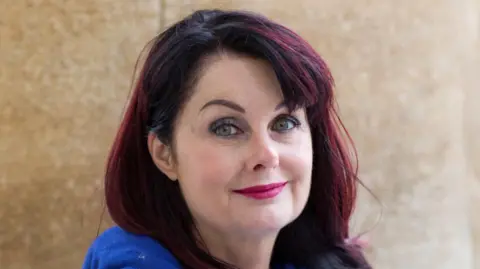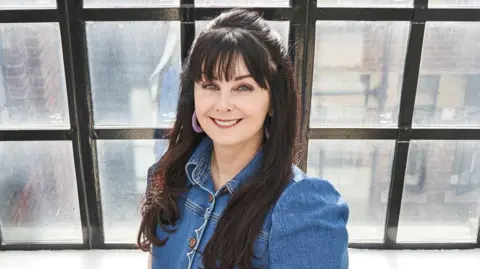‘I would never have been a writer if I was still drinking’


Emma Saunders ,Culture reporter at the Hay Festival
 Getty Images
Getty ImagesBestselling author Marian Keyes has said she would never have become a writer if she hadn’t got sober 30 years ago.
The Irish writer, behind books including This Charming Man and The Break, told an audience at the Hay Festival: “I wouldn’t have had the discipline or self-belief.”
But she joked: “I came to the writing business blessed (with material).
“I suffer from depression, I have very frizzy hair and I was an addict!”
She added: “I went to rehab and learned huge amounts about myself. It taught me so much about surviving in a painful world.”
Keyes, whose hundreds of fans strained to hear her against the background noise of a very heavy downpour at the literary event, said rehab also helped her to deal with life’s inevitable knock-backs and made her “far more positive”.
While she grew up in a loving family with “a fabulous mother”, Keyes said people used to joke that “any Irish mother who was discovered giving her child self-esteem was stripped of their citizenship.”
She believes some of that attitude stems from Catholicism: “You’re born and are already a sinner… God is always watching. It’s impossible to feel like you’re not getting things wrong all the time.”
She added that Irish women were brought up to believe they should “never complain or put their head up above the parapet”.
“I love how it has changed, and that the young Irish writers, the women, they’re so different.”
‘Had to be funny’
Keyes also acknowledged the strong tradition of storytelling in Ireland which shaped her upbringing and, subsequently, her career.
“It’s a cliche that all Irish people are storytellers but my mother is a fantastic storyteller,” she said.
“Humour was the way we were valued in the home. You had to be funny. Any bad thing that happened to us, I learnt that that bad thing plus 20 minutes meant a funny anecdote!”
But she said there were bigger, external reasons for the tradition as well.
“We were colonised for so long, we were not allowed to speak our language, we couldn’t own property, we weren’t allowed to be educated, we weren’t allowed to practice our religion. Very little was left, it was basically music and words. Words are our survival.
“And as soon as the colonisers left, the Catholic Church moved into the vacuum. We’re constantly trying to be free.”

Her own way with words is adored by her legions of fans largely due to her knack of tackling dark subjects such as depression, addiction and infertility – all of which Keyes has experience of – with humour and relatability.
Her book Grown Ups is currently being made into a TV series for Netflix: “It would be so, so nice if they could use people who could do Irish accents properly. They don’t have to be Irish.
“I would also like a cameo, and my mother wants one as well – the best place we could be in would be a chemist because we enjoy bad health!”
Graham Norton once noted that “she uses humour like a Trojan horse, in which she smuggles in all sorts of difficult issues.”
Her latest book, My Favourite Mistake, is no different.
It’s a follow-up to her 2006 novel, Anybody Out There?, where we catch up again with high flying PR executive Anna Walsh, one of the Walsh sisters, who first appeared in Keyes’s debut, Watermelon.
Having something of a mid-life crisis (while dealing with perimenopause), Anna leaves New York and returns to her native Ireland, burnt out.
Keyes jests: “Manhattan is no place for the weak or the young. You need a bucket of B vitamins to live there!”
Anna soon finds herself embroiled with an old flame (Joey) and involved in a criminal investigation at a holiday retreat on the coast.
It doesn’t sound like a barrel of laughs but it’s peppered with Keyes’s trademark banter and hilarious encounters.
‘Forgettable froth’
“Mid-life crises do happen. There’s a phase in everyone’s life… I realised I’ve lived more years than I’m going to live. When they told me I was going to die one day, they weren’t actually lying! It focused the mind,” Keyes said.
“All those things I had been putting off for one day. That one day is now.
“Anna has bumped up against perimenopause and again, when it happened to me, I was like: “Me? Me? It’s happened to me? I’m not ready for this.”
Reviews have been largely positive, with the Telegraph’s Marianka Swain giving it four stars, and the Independent’s Francesca Steele describing it as “a novel about the rambunctious Walsh family hits home for anyone at middle age”.
The Guardian’s Hephzibah Anderson said Keyes’ book would win her something “long overdue in snootier literary quarters: respect”.
Keyes says she had originally planned to write an opus across 40 years but decided to write a love story instead following the pandemic.
“I wanted to take comfort and retreat to a happy place.
“I wanted it to be people in mid-life because people fall in love at any age. They (Anna and Jamie) have hurt each other. They both did bad things. I wanted it to be a realistic story; you can’t come to a midlife relationship without things you are truly ashamed of. I wanted to write about shame. We’re only human. We are all flawed.”
While her work is often dismissed as being lightweight romance, Keyes says she “doesn’t mind anymore” and that “the perception of me has changed.”
“There will always be people who regard me as forgettable froth and that’s fine. What I mind is when a woman writes about a relationship or a family, it’s dismissed as froth but if a man does it, it’s regarded as far more meaningful. I’m afraid that’s just part of the patriarchy.
“All we can do is keep trying, keep pushing and for women to recognise within ourselves our own internalised misogyny and to push back against it.”
Source link





